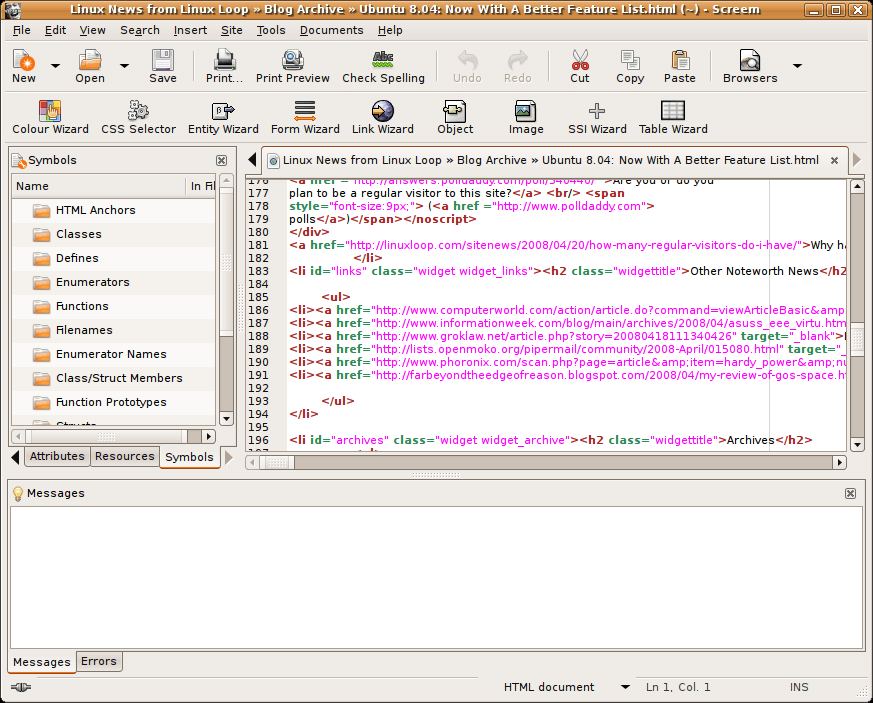Last Updated on October 17, 2023
SCREEM (Site CReating and Editing EnvironMent) is a tag-based Web page editor which aims not only to aid in creating web pages, but also to provide useful site maintenance facilities, including automatic link updating and site upload facilities.
SCREEM has more than just the usual HTML tags, with features for including JavaScript, PHP, cascading style sheets, etc within your site.
Unlike most other web site / HTML editors SCREEM does not provide a WYSIWYG display of pages. Instead you are presented with the raw HTML source in its editor window.
It is written for use with the GNOME desktop environment.
Features include:
- Cut / Paste including from the GNOME web browser.
- Page Previewing.
- Page Templates.
- Search / Replace.
- Spell Checking.
- Syntax Highlighting.
- Tag Trees.
- Inline Tagging – displaying a popup menu showing the valid attributes while typing in a tag.
- Intelliclose – autocompletes tags.
- Link Fixing.
- Broken Link Checking.
- Publishing – incorporates Sitecopy to update a remote site.
- Document Structure Display, select element blocks and see if you have closed elements correctly.
- DTD/Doctype Parsing – the ability to determine which doctype a page uses, and process the Document Type Definition (DTD) file.
- CVS support to aid development where there are multiple developers.
- Task management.
- Wizards.
- Helper Applications.
Website: www.screem.org
Support:
Developer: David A Knight, Lee Mallabone, Joe Orton, Sven Liessem, Matt Colyer, Sven Salzwedel
License: GNU GPL v2

SCREEM is written in C. Learn C with our recommended free books and free tutorials.
Return to Editors Home Page | Return to HTML Editors Home Page
| Popular series | |
|---|---|
| The largest compilation of the best free and open source software in the universe. Each article is supplied with a legendary ratings chart helping you to make informed decisions. | |
| Hundreds of in-depth reviews offering our unbiased and expert opinion on software. We offer helpful and impartial information. | |
| The Big List of Active Linux Distros is a large compilation of actively developed Linux distributions. | |
| Replace proprietary software with open source alternatives: Google, Microsoft, Apple, Adobe, IBM, Autodesk, Oracle, Atlassian, Corel, Cisco, Intuit, SAS, Progress, Salesforce, and Citrix | |
| Awesome Free Linux Games Tools showcases a series of tools that making gaming on Linux a more pleasurable experience. This is a new series. | |
| Machine Learning explores practical applications of machine learning and deep learning from a Linux perspective. We've written reviews of more than 40 self-hosted apps. All are free and open source. | |
| New to Linux? Read our Linux for Starters series. We start right at the basics and teach you everything you need to know to get started with Linux. | |
| Alternatives to popular CLI tools showcases essential tools that are modern replacements for core Linux utilities. | |
| Essential Linux system tools focuses on small, indispensable utilities, useful for system administrators as well as regular users. | |
| Linux utilities to maximise your productivity. Small, indispensable tools, useful for anyone running a Linux machine. | |
| Surveys popular streaming services from a Linux perspective: Amazon Music Unlimited, Myuzi, Spotify, Deezer, Tidal. | |
| Saving Money with Linux looks at how you can reduce your energy bills running Linux. | |
| Home computers became commonplace in the 1980s. Emulate home computers including the Commodore 64, Amiga, Atari ST, ZX81, Amstrad CPC, and ZX Spectrum. | |
| Now and Then examines how promising open source software fared over the years. It can be a bumpy ride. | |
| Linux at Home looks at a range of home activities where Linux can play its part, making the most of our time at home, keeping active and engaged. | |
| Linux Candy reveals the lighter side of Linux. Have some fun and escape from the daily drudgery. | |
| Getting Started with Docker helps you master Docker, a set of platform as a service products that delivers software in packages called containers. | |
| Best Free Android Apps. We showcase free Android apps that are definitely worth downloading. There's a strict eligibility criteria for inclusion in this series. | |
| These best free books accelerate your learning of every programming language. Learn a new language today! | |
| These free tutorials offer the perfect tonic to our free programming books series. | |
| Linux Around The World showcases usergroups that are relevant to Linux enthusiasts. Great ways to meet up with fellow enthusiasts. | |
| Stars and Stripes is an occasional series looking at the impact of Linux in the USA. | |